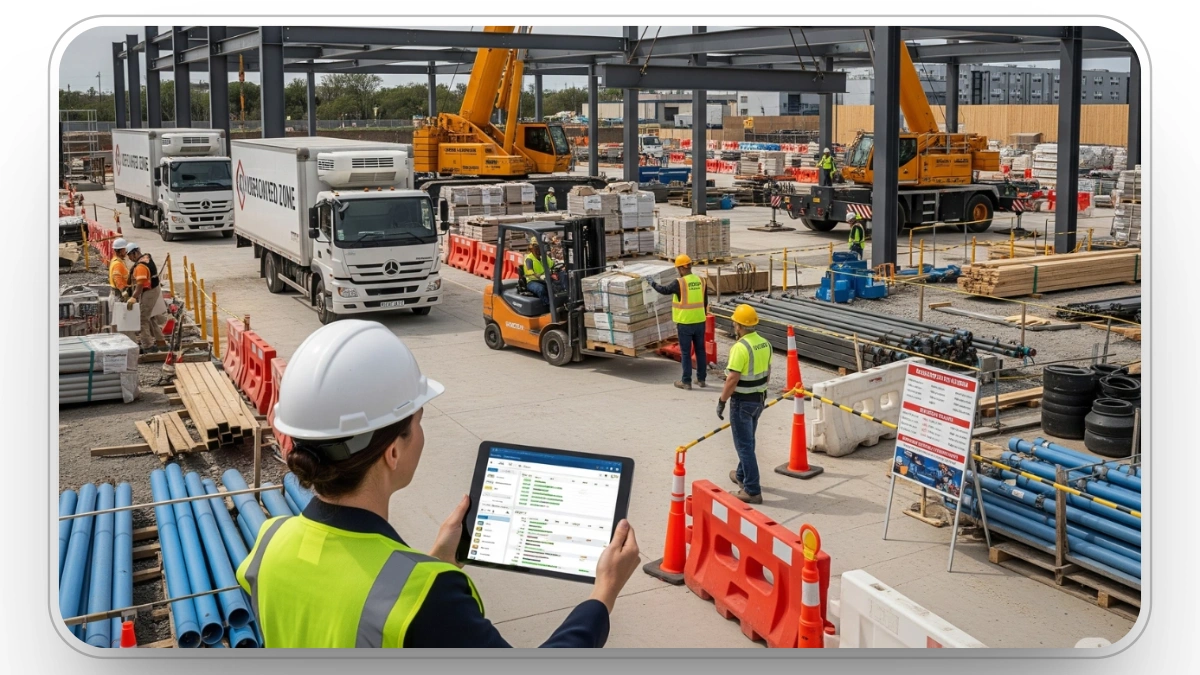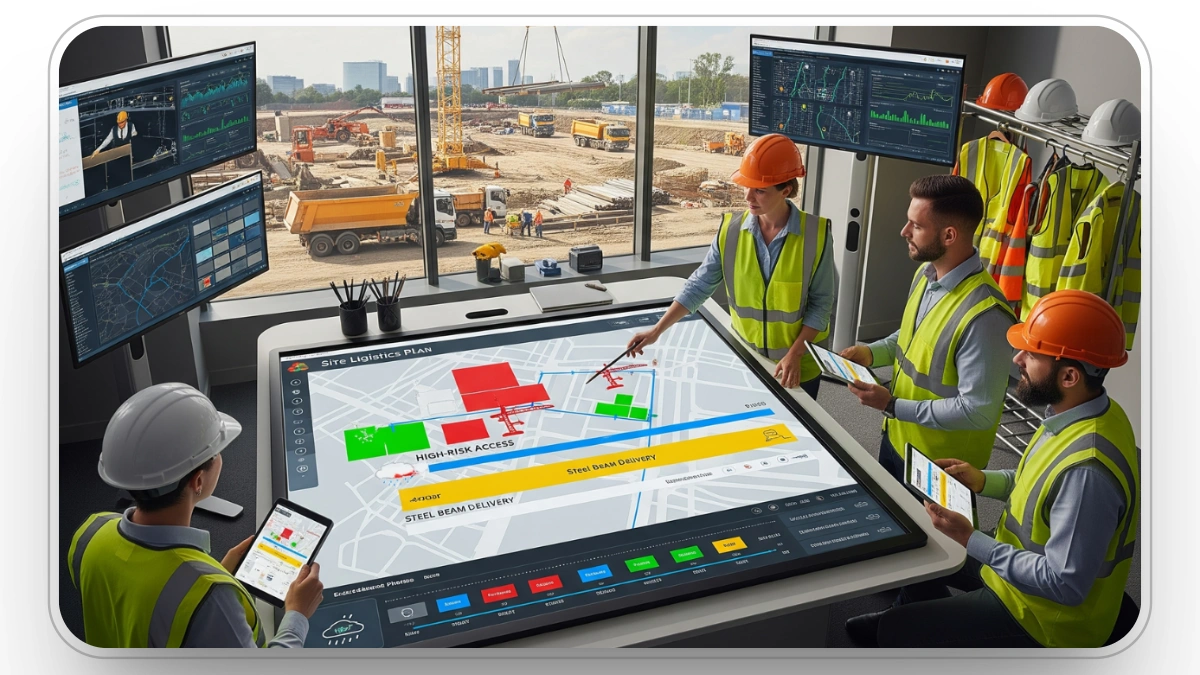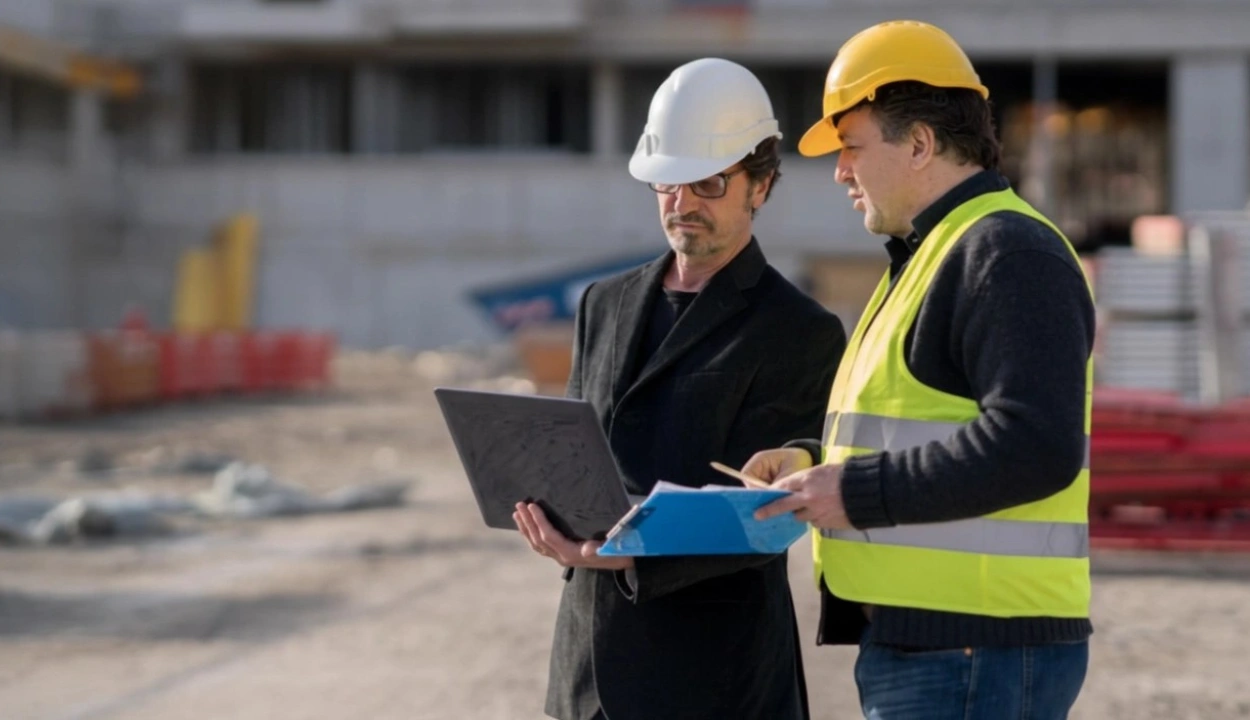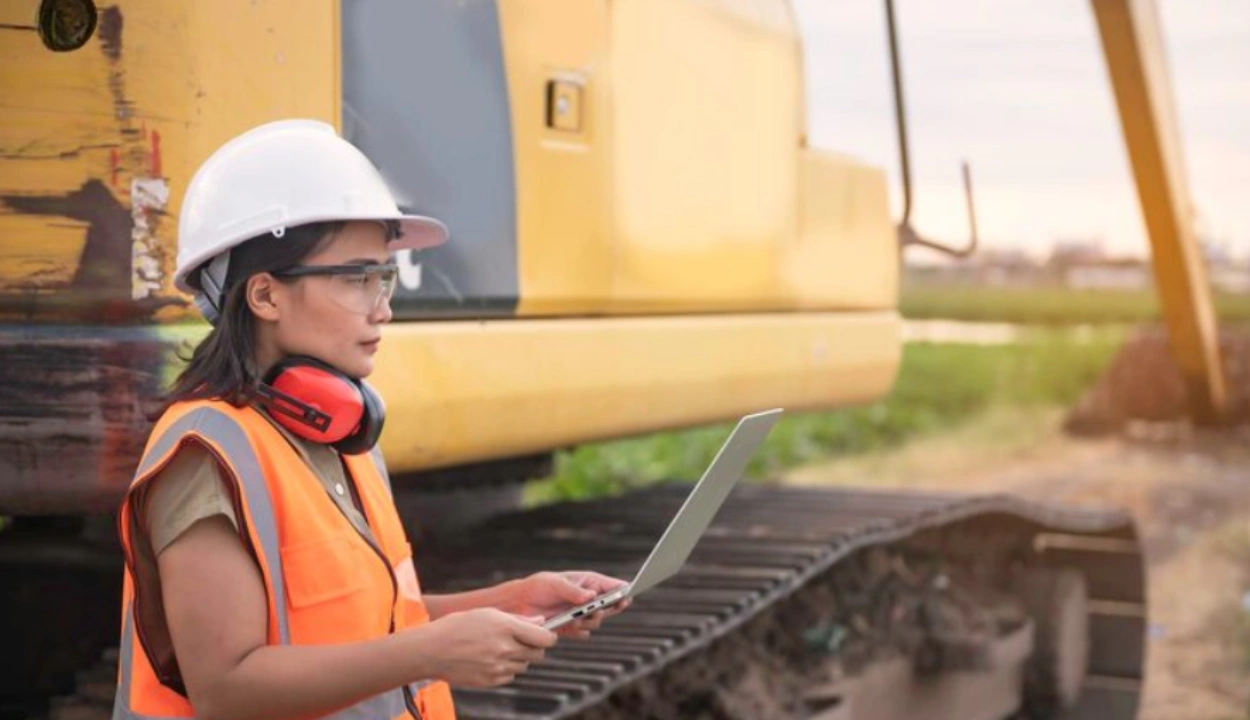Construction Site Logistics Management: A Comprehensive Overview
You might not use the term ‘construction logistics’ every day, but you feel it when it’s done right. It’s the discipline of moving and storing materials, equipment, and people so projects stay on schedule and on budget. With strong logistics, projects finish faster and cost less.
A logistics plan for a construction site is essential. A good plan can make a big difference in how smoothly a project goes and how much it costs.
But making a good plan can be challenging. It takes a lot of careful thinking, research, teamwork, and flexibility. And having the right tools can help everyone involved understand what's happening next.
Understanding Construction Site Logistics

Construction site logistics, also known as Inventory management at motion and rest by logistics managers, refers to planning, controlling, and executing resources, workers, transportation, and procurement of materials required for a construction project.
Construction site planning and logistical operations involve transporting, storing, and distributing materials and equipment. It ensures resources are available when needed and used efficiently.
Good construction project site logistics plans prevent delays and accidents, while poor planning can lead to disruptions. Despite challenges, mastering logistics improves productivity and safety on-site.
Factors for Success
Three areas where construction managers and contractors can benefit from having construction site logistics include
Cost
Efficient management of construction site logistics can significantly impact project costs.
- Construction managers and contractors can reduce project costs by optimizing the routes, scheduling deliveries, and minimizing on-site material handling.
- Well-organized logistics can help avoid costly delays and avoid risks of going over budget.
- Proper inventory management and space setups can minimize unnecessary waste and expenditures.
Adopting proper construction site logistics practices can save costs and improve project profitability for managers and contractors.
Here are a few figures from the USBL2023 findings to better understand how the costs associated with business logistics are increasing.
This increase and added issues with equipment and logistics can cost the contractors a lot of money in the long run.
This is why it is important to have a construction site logistics management plan beforehand.
Overall costs have jumped nearly 20% in a single year and over 46% since 2020, making strong logistics strategies essential to avoid overruns.
Time
Efficient coordination of construction site logistics is crucial for the timely construction site management.
- Construction managers can minimize downtime and uphold project schedules by adequately managing deliveries, timely resource availability, and workflow optimization.
- Streamline logistics to improve coordination among subcontractors and workers, this can improve in reducing idle time and boost overall productivity.
- Strategic logistics planning takes into account potential delays. It provides preventative measures to mitigate those delays to ensure the project remains on track.
Overall, prioritizing construction site logistics enables managers and contractors to maintain their sites promptly.
Work Quality
Construction site logistics directly impact the quality of work. You can ensure success by considering proper safety measures and resource availability.
- Effective logistics processes help managers and contractors avoid any risks that might arise, rework any issues, and point out inconsistencies during construction activities.
- Coordinating deliveries and storage areas helps protect materials from damage and preserves resource integrity throughout the project.
- Well-designed workflows and clear communication help create a seamless collaboration among the teams.
- By emphasizing safety protocols and optimizing site access, logistics planning fosters a safer work environment, further enhancing the overall quality of work.
Effective construction site logistics ultimately contribute to superior project outcomes and heightened client satisfaction through maintaining high work standards.
Critical Considerations for Crafting a Construction Site Logistics Strategy

Navigating the intricacies of construction site logistics demands careful planning and strategic decision-making.
As projects evolve, so do the challenges associated with managing material flows, coordinating deliveries, and ensuring site safety.
This is why there are a few factors you should seriously take into consideration while forming your construction site logistics plan.
1. Evaluating the Physical Site Environment
When planning a construction project, putting thought into its site is crucial. Factors like how the land is shaped, the area's weather, and how they can affect the project are essential to consider.
For example, if the weather is often bad where you're building, you will need a plan to protect your materials and equipment.
You will also need to check on weather conditions to account for delays.
Ensure that you have set aside enough time for each step of the project. You have to ensure that your workers have the time to finish tasks and that resources are available promptly to avoid delays.
2. Compliance with Local Regulations and Ordinances
When creating a construction plan, ensure that you follow all the area's essential rules and laws. These rules can cover noise violations, traffic access or blockage, and most importantly environmental impacts.
Not adhering to these rules can lead to fines and delays due to the site getting shut down. By understanding and compiling the rules construction companies can avoid problems and keep the project running smoothly.
3. Efficient Material Handling and Storage
In any logistics plan, storing materials properly is crucial. It helps prevent damage, ensures materials are ready when needed, and reduces the time spent moving them around.
When planning storage, consider what materials you have, how long the project is, how much material would be required, and how much space is required to store those items. Look into safe places to store inventory to ensure they are safe from damage.
The size of the job site determines how much storage space you need. If it is small, you can use off-site storage or otherwise you need temporary storage facilities on-site. Ensure that you have the proper space for storing inventory.
4. Streamlining Delivery Logistics
Delivering big and heavy materials to construction sites can take time, especially in busy city areas. These places often need more access, making getting materials in and out easier.
Plus, construction sites usually need to be more organized, which makes unloading and storing materials tricky.
That's why planning delivery logistics is vital when creating a construction plan.
You need to think about how big and heavy the materials are, how many trucks you'll need, which route they'll take, and when they'll arrive. Considering all these things helps ensure deliveries go smoothly and materials are kept safe on-site.
5. Ensuring Site Security Measures
Keeping a construction site safe and secure protects workers and equipment from potential harm or theft.
When creating a construction logistics plan, prioritizing site security is essential.
- Enhance security by controlling access to the site.
- Install fences and gates and employ security guards.
- Having a plan for handling intruders.
Moreover, it's vital to establish clear protocols for addressing emergencies. Security measures in a construction site are crucial for employee and public safety.
6. Effective Risk Mitigation Strategies
Construction projects come with risks, and it is essential to consider them when planning. Sometimes even the smallest of mistakes can cause significant delays or accidents.
The first step for risk mitigation is to determine what can go wrong, it can be factors like bad weather and even busy roads. Once the risks have been identified, you can easily devise ways to avoid the risks or work around them. A good risk management plan ensures construction projects stay on track and within budget.
7. Optimizing Project Scheduling
Construction projects involve different tasks simultaneously, like plumbing, wiring, and building. So, it's crucial to plan everything carefully to avoid delays.
Also, we must ensure the delivery timing matches when we need materials and equipment on site. It's tricky, but it's vital for keeping the project on schedule.
A good plan for how everything fits together will make sure the project gets done on time and doesn't cost more than it should.
8. Implementing Sustainable Waste Management Practices
Construction projects create a lot of waste, like leftover materials and debris from demolitions. Handling this waste properly is essential for keeping the site clean and safe and lessening the project's environmental impact.
When planning how to manage waste in a construction project, there are a few things to consider:
- The first step is to know how much waste will be produced, this can include debris, leftovers from the demolition, plastic, paper, and even rubble. Once identified you can make a plan to dispose of them properly.
- Once the plan is completed, you must consider eliminating the waste safely.
- The third and final step is to consider recycling. Many items that are considered waste like metal and glass can be recycled. Recycling is not only waste-reducing but also cost-saving.
An essential tip for making your construction site logistics planning more accessible and more sustainable is to consider checking out a great construction site logistics plan software like Clue that can help you plan your inventory accordingly.
Factors Logistics Managers Need to Consider During Construction Site Logistics

Construction projects are always different. Even if they seem similar, different people might want different things, or there could be changes along the way. This means those managing how everything gets done need to be ready to adapt.
Managing construction sites involves many moving parts and people. Nowadays, there's a big focus on using technology to make things run smoother.
Integrating Technology for Seamless Logistics
Construction logistics management becomes far more efficient when it’s part of a connected technology ecosystem. Integrating logistics planning tools with GPS-enabled fleet tracking, project management software like Procore or Autodesk Build, and IoT-enabled inventory sensors provides real-time visibility into deliveries, material usage, and equipment status. This integration allows managers to respond to delays instantly, optimize resource allocation, and ensure smooth coordination between all project stakeholders.
While not a complete construction site logistics plan checklist, here are key considerations for effective planning:
- Define required materials by phase and delivery zone.
- Confirm all equipment bookings, including cranes and lifting time slots.
- Set delivery schedules, routes, and staging areas.
- Verify access points, haul roads, and any needed road or traffic permits.
- Allocate on-site and off-site storage based on material type and volume.
- Establish inspection protocols for deliveries, including damage and shortage reporting.
- Ensure safety compliance with OSHA and local site regulations.
- Align procurement lead times with prefabrication and just-in-time delivery requirements.
- Implement cybersecurity measures for connected systems (GPS, IoT, telematics).
Remember to keep our equipment in good shape, update our technology, and ensure we have enough people to get the job done.
Conclusion
Construction site logistics might sound complicated, but there are some easy things you can do to make your project go smoothly.
First, team up with a logistics partner who knows their stuff. They'll make sure materials and equipment get to the site on time and in the correct order.
Planning is also crucial to avoiding delays. Following these tips and using handy construction site logistics software like Clue Insight can keep your construction project running smoothly and successfully.
FAQs
What are construction site logistics?
Construction site logistics is all about planning and managing the movement of stuff like materials, tools, and people at a construction site. It includes figuring out when deliveries should arrive, where to put materials, how to get everything to the site, and keeping everyone safe. It's about ensuring everything is in the right place and time to complete the job smoothly.
What are the benefits of using specialized software for construction site logistics management?
Using specialized software like Clue Insights for construction site logistics brings benefits like:
- Better efficiency in coordinating deliveries and scheduling.
- Real-time visibility into materials, equipment, and personnel.
- Improved communication among project stakeholders.
- Cost savings through optimized processes and enhanced safety measures.
How do you handle unexpected events or disruptions in construction site logistics?
When unexpected events occur in construction, you should:
- Quickly evaluate the situation.
- Modify plans as necessary.
- Inform all parties of any changes.
- Collaborate to resolve issues and maintain progress.
Transform Your Equipment Management

.webp)









.webp)

